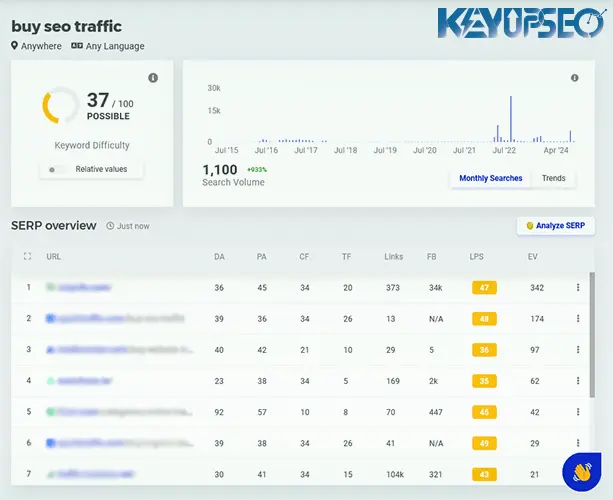
What is keyword research?
Keyword research means checking the number of searches for each word or phrase in Google in order to determine the interest of the target audience.
You need to know what are the most searched terms in your business and what everyone is looking for to get to the best site? What are these words that are so popular? What are they for and how can they be found?
By doing keyword research, you will understand which of these topics are more important for the target user and which words are more important for your business.
How many people are interested in your business and searching for your products and services. You can even check if the search trend is increasing or not and how much your market is growing.
Identifying them and SEO of the site with important keywords will increase site visits traffic for you. You can also provide this important SEO parameter with Buy Website Traffic from KeyUpSeo.
Why is keyword research important?
Keyword research is one of the most important and profitable activities in search engine marketing. This research is not only done to attract visitors to the site, but its purpose is to attract those visitors who find the content of your site useful and who are exactly looking for your content or product.
In fact, you will not only understand which phrases and keywords will improve your site's SEO, but you will also get to know your customer community better.
More broadly, with keyword research you can anticipate changes in market demand, respond appropriately to these changes, and produce goods, services, and content that people are looking for.
So you have to proceed with principles, it is better to use the right keywords to get your website to the top results of Google.
In the following, we will explain to you step by step how to find keywords and check the value of words for business.
Keyword research tools
Where can I get this information about the keyword? Some important tools to achieve this goal are Keyword Planner, Google Trends, Microsoft Bing Ads Intelligence and bing webmasters.
However, there are other tools such as kwfinder, Moz Keyword Explorer, or Wordtracker, which also provide users with the amount of searches for the desired keywords along with the trending of these words, but one thing you should know is that these tools are free. Are not!
With that said, Google Keyword Planner is one of the most common starting points. This tool not only estimates the search volume of suggested keywords, but also calculates the cost of running paid campaigns for these terms.
Keyword research training with keyword planner tool
As we said, one of the great tools for searching and researching keywords is the Google Keyword Planner tool, which is very easy to work with.
To use this tool in the first step, you must have a Google Ads account; It means that you have used Google Ads.
Now log in to the account and select Keyword planner from the Tools menu and then the Planning section.
On the next page, first click on Discover new keywords and then enter the related keywords that you think are important. Think about what terms users might use to search for your business; Enter them all in this field.
The thing you should pay attention to is that not all users think the same. For example, the word "phone" is used for one, and the word "mobile" for another.
If your business is buying and selling mobile phones, check both of these in your keyword research.
By entering the desired word and clicking on get result, on the next page, you will be shown the number of times each term is searched in a month.
After you have selected the desired words, click Add keywords and go to the Keywords section from the menu on the left side of the page.
Teaching keyword research with Kwfinder tool
Another keyword research tool is the KWFinder tool. This tool, like the Keyword Planner, shows you the average keyword searches per month, the trend of the word, the difficulty of the keyword and related words, but as we said, this tool is not free, and you have to register and pay for your account. Provide.
Working with kwfinder is very simple, just log in to your account and then enter the keyword in the search field.
Other information that the KWFinder tool provides you in keyword research. The image below on the right shows the word search trend in different months. On the left side, you can see the SEO difficulty of the word. The higher the difficulty of SEO, the harder it is to rank in the desired keyword.

How to measure the value of a keyword?
How important is a keyword to your site? For example, if you have an online shoe store, have your customers landed on your website by searching for terms like "brown shoes" or "white linen"?
The keywords that users search for are usually available to webmasters, and keyword search tools provide us with the necessary information. However, these tools cannot show us how much traffic from these searches is worth to our site.
To understand the value of keywords, we must first understand our website, make assumptions, test those assumptions, and iterate.
The process of evaluating a keyword
To see how valuable a keyword is to your business, you can do the following.
Ask yourself
Is the keyword relevant to your content? Will people find what they want on your site by searching for this keyword? Will they be satisfied with what they find? If the answer to all these questions is "positive", you can go to the next step.
Search for your keyword in Google
Search for your desired keyword in Google and see if Google shows similar businesses in the results or not? Knowing which websites are benefiting from your target keywords will help you get a better view of this competitive market. Also, you will know what path you need to take to reach your goals.
Have you noticed the ads on the top and right side of search results pages? Many of these ads use valuable keywords. What you need to do is that in your ads on the search results page, you need to go for the words that are most likely to attract the audience and convert them into customers.

Use Google Ads
One of the ways that can help you understand which words are valuable for your business and effective in improving your sales is using Google Ads; But you should pay attention to one thing; Since it costs you money to set up a Google Ads campaign, you must have an optimized campaign with proper management to hit two birds with one stone; It means that your sales will improve, and you will understand on which words you had more sales.
For example, let's say you have a website selling laptops, and you use the following keywords for your site.
- Laptop
- Buy a laptop
- laptop price
- Asus laptop
- New laptop models
Based on the search of these keywords, your site has been shown 5000 times in Google results, and in this way 1000 people have entered your site; Finally, 100 of these visitors bought from your site.
You can see which words these 100 buyers entered your site by searching, or in other words, how many customers each word brought to you.
For example, out of these 100 people, 50 people entered the site by searching the word "buy laptop", 20 people "laptop price", 15 people "Asus laptop", 10 people "new laptop models" and 5 people "laptop". And finally they bought. Now you know how valuable the word "buy laptop" is for your business, because you have made more sales with this word.
Obtaining such information is one of the main attractions of Google Ads. It's no wonder businesses love search engine marketing!
Are long keywords necessary?
Let's go back to the example of the online shoe store. Is it good to rank first for the keyword "shoes"?
Targeting keywords that are searched for 5,000 times or even 500 times a day sounds fantastic, but in reality, these searches account for up to 30% of all searches on the web. The remaining 70% are actually what we call long tail keywords.
This sequence contains hundreds of millions of unique searches, which may only be searched for a handful every day, but collectively, they make up the majority of online searches on the Internet.
Another lesson that search marketers have learned is that long-tail keywords tend to have better conversion rates because they are seen more often in the conversion or purchase cycles. A person searching for "shoes" is usually browsing the web and not looking to buy, but if the search term is something like "adidas shoe price size 42", that person is probably looking to buy shoes.
The importance of keyword research in SEO
In general, to determine the path of SEO and create a suitable strategy, you must do keyword research well.
We suggest that you read Common mistakes in choosing and researching keywords to avoid mistakes in this direction.
It can be said that the whole of what we have said about the keyword research process consists of six steps:
-
Make a list of important topics related to what you know about your business
Think about your general headings to start. Depending on the type and size of your business, you may end up with 5-10 general topics.
If you're a blogger, these headings can be general topic categories for your site. Put yourself in the shoes of your audience or customer. What topics are they looking for that might lead them to you?
-
Identify keywords in general topics
Now that you have determined the general topics of the work, it is time to determine the keywords related to each topic. These are the keywords that you believe can get you higher in the SERPs. Your target customer is likely to search for these keywords or phrases in search engines. For example, if one of your topics is "digital marketing" you might end up with a list like this:
- Digital marketing tools
- How to set up your digital marketing unit?
- What does digital marketing mean?
- Differences between traditional and digital marketing
- Digital marketing software
- Email marketing
Note that the list obtained at this stage is not yet final and needs to be checked and manipulated.
-
Research relevant search terms
This step requires a little creativity. If you still feel like there are more words left to add to your list, use Google's Auto Complete feature to find out what other keywords people are searching for that you haven't thought of yet. At the bottom of the search results page, you can also see Google's suggestions for other related keywords.

-
Make sure your listing is a mix of primary keywords and long tail keywords
In the upper parts of this article, we explained about the importance of the topic, and we will not go into more details.
The traffic that comes from long tail keywords is usually related to the audience that is closer to your topic and probably more professional users, but this does not mean that the main and shorter keywords should not be in your list.
-
Monitor the work of competitors using your keywords
You don't have to do exactly what your competitors are doing. This is also true for keywords. If a keyword is important to your competitor, it shouldn't necessarily be important to you, but it's still important to know what keywords your competitors are using to drive traffic.
Your work should focus on two different aspects: improving your position in relation to the keywords used by your competitors, and addressing the keywords that your competitors have not yet targeted. One of the powerful tools that can help you at this stage is SEMrush.
-
Use Google Ads or similar tools to get better keywords
Google's Keyword Planner tool is a great opportunity to check the status of keywords and choose the best among them. Google Trends can also help you a lot to monitor trends and even predict the status of these words in the future.
Release date : 26 May, 2024













